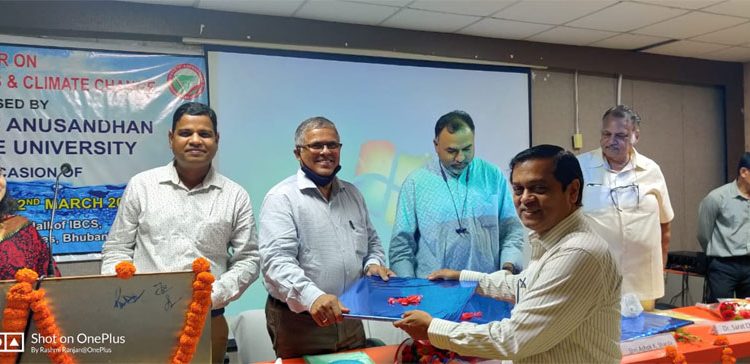Bhubaneswar(Kalinga Voice) : Experts have warned that climate change has already started to have a vicious impact on humanity calling for urgent measures to arrest and reverse the trend while pointing out that human activities were the greatest contributing factors to the developing situation.
“Rising sea levels caused by global warming had begun to gobble up villages in Odisha while indiscriminate use of water could lead to an unimaginable situation in the future,” Mr. Ranjan K. Panda, Convenor of Combat Climate Change Network, India, said on Monday.
Seven villages in the Satbhaya area of coastal Kendrapara district in Odisha had been devoured by an advancing sea while several villages in Astaranga block of Puri district were facing the same fate, Mr. Panda, also known as ‘Waterman of Odisha’, said while speaking at a seminar on ‘Global Water Crisis and Climate Change’ organised by the Institute of Computer and Business Studies (IBCS), faculty of management sciences of SOA, to mark the World Water Day.
The Bay of Bengal has been advancing by a few meters in the coastal areas after every cyclone which had become more frequent while saline water ingress had been noticed up to a distance of five km from the sea in Astaranga area, Mr. Panda, a researcher, environmentalist and activist, said.
Dr. Sarat Chandra Sahu, Director of Centre for Environment and Climate, SOA and eminent meteorologist and Mr. Ashok Kumar Sharda, Vice President (Commerce) of Utkal Chamber of Commerce and Industry (UCCI) were the other speakers. Prof. Anup Kumar Samantaray, Dean of IBCS, and Dr. Duryodhan Jena, Associate Professor, also spoke. Stating that nearly two billion people had no access to safe water resources, Mr. Panda said large groups of people had little water to meet their needs even as they were advised to wash their hands frequently to prevent Covid19 contamination. Covid-19 has actually forced us to think and it has also brought a glimmer of hope as it provided nature to regenerate itself as humans confined themselves to their homes, he said adding dolphins were found frolicking in a stretch of the Ganges while the haze lifted to make the Himalayas visible from hundreds of miles.
“People must understand that they have to live in harmony with nature and rivers were not pipes which could be bent. We have become unsustainable.I now belong to a credit card generation as I am using the water which belonged to my grandchildren,” he said.
The call of the hour is to protect our forests and plant more trees while being water prudent, Mr. Panda said. Dr. Sahu said only 2.5 per cent of the entire water resources in the world was available for human use of which two per cent was in the form of ice. The entire humanity was dependent on only 0.5 per cent of the water was available for use as the rest was in the oceans and seas. Climate change was resulting in extreme weather events which caused highly destructive floods in urban areas for which humans were responsible, Mr. Sahu said adding activities like removal of water absorbing plant cover from the soil and construction of buildings on flood plains adjacent to rivers led to the frequent catastrophes.
The urban population, which stood at 41 percent in 2015 was expected to rise to 56 per cent in 2030 which would further accentuate the situation while climate change was expected to have more severe repercussions in the future.
The length of the summer season, now experienced for three months, could extend to seven months by 2030 while the number of India’s perennial rivers may get reduced from 17 now to 6 by that time.
The development would have long term effect on human health and expenditure on health care could rise from seven percent of the income now to 20 percent by 2030, Dr. Sahu said.
Mr. Sharda stressed the need to bring down emission levels to counter global warming saying India had agreed to reduce emission to 2005 level by 2030. Shifting the focus to solar power generation could provide a boost to the efforts to com five million hectares every year, he said.

